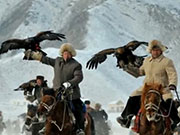Life in the golden eagle village

 0 Comment(s)
0 Comment(s) Print
Print E-mail CNTV, October 13, 2016
E-mail CNTV, October 13, 2016
Falconry is the art or sport of hunting with birds of prey. Hunting with eagles on horseback is an ancient tradition among some of China's ethnic minorities like the Kyrgyz and Kazakhs. Xinjiang is hoping the sport can enjoy a resurgence to help boost tourism. In today's episode, reporter Han Bin goes to Akqi County, in Kizilsu Kyrgyz Autonomous Prefecture, which borders Central Asia. He meets a golden eagle master and learns about the bond between the man and the birds.
Falconry is the art or sport of hunting with birds of prey. Hunting with eagles on horseback is an ancient tradition among some of China's ethnic minorities like the Kyrgyz and Kazakhs. Western China's Xinjiang Uyghur Autonomous Region is hoping the sport can enjoy a resurgence to help boost tourism. Today, in our series Xinjiang: Exploring China's New Frontier, reporter Han Bin goes to Akqi County, in Kizilsu Kyrgyz Autonomous Prefecture, which borders Central Asia. He meets a golden eagle master and learns about the bond between the man and the birds.
Deep in the valley of the Western Tianshan Mountains, live the last of China's Kyrgyz eagle hunters. They still live a nomadic life. 65-year-old Kurmax Kutman is among the top 20 masters in Akqi County. He receives a subsidy for keeping the tradition alive. For the Kyrgyz, the golden eagle is a symbol of freedom and spirit.
"I grew up watching my grandfather train golden eagles, and I was obsessed with this tradition. The process of capturing and training an eagle is like bringing up a child. You need to train it and respect it like your own child, then; it will give everything back to you," Kurmax said.
The Akqi government wants eagle hunting to promote tourism. But the number of real hunters is dwindling with old age. Kurmax hopes to pass on his skills to his 17-year-old grandson. Hunting with eagles is a solitary, challenging way of life.
It requires a strong will to harness the force of nature.
Like all of the masters, Kurmax fears the art will die out, as young people are going to big cities or have no time.
Today, Kutubek Mukash is following his grandfather to experience the life of the old hunters. It's like a journey into the past.
The birds are not used to the noise of civilization.
Real hunters live deep in the mountains. During winter, they set off on horseback, to hunt foxes and rabbits.
Kurmax hopes this experience can give his grandson, a sense of pride to become an eagle master, though he knows the boy may have different thoughts.
In half a year, his eagle, Ak Burkut, will be released to find a mate... and his destiny.
"I want to thank the eagle before I release him back to nature. He has been my companion for 4 years and given me a lot of pleasure. We've cooperated well. Hunting has been successful. I hope he is also grateful to me, and that we each cherish our time together," Kurmax said.
Akqi's mountains are the golden eagle's fortress. Getting to their nests is a challenge. Most young eagles are taken when their parents are away. Their relationship with humans begins the moment they are captured.
Akqi is known as the county of eagles in Xinjiang. The traditional hunting method is a prominent part of the Kyrgyz culture in the autonomous region. Urbanization is making the masters feel the urgency to pass their skills on to the next generation.
Kutubek says the older generation is living at the edge of the world. He is proud of his grandfather, but he can't follow him all the way.
"Many people feel that this tradition is on the verge of extinction. I don't want to see traditions being lost, but I know that day will come," Kutubek said.
Kurtubek says his grandfather is a living legend in Akqi. Today, ancient tradition becomes a luxury of modern life. And as urbanization takes over, the eagles and the hunting traditions, may fly away forever.



 Add your comments...
Add your comments...

